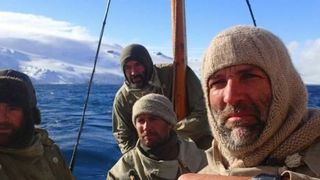Society is Too Risk Adverse, Says Explorer
An inspirational chat with explorer Tim Jarvis, the star of Discovery Channel’s show Shackleton: Death or Glory

The story of Ernest Shackleton and his crew’s escape from Antarctica would be dismissed as unbelievable if it was a book or a film. In the Discovery Channel show Shackleton: Death Or Glory a crew of five British and Australian adventurers join expedition leader Tim Jarvis to attempt became the first people to authentically re-enact Sir Ernest Shackleton’s perilous voyage from Elephant Island to South Georgia.
Were you prepared to lose a finger while on the expedition?
The answer is without a doubt. Leadership is a case of managing expectations. This was not a walk across the Cotswolds. If you’re prepared to go any lengths, you will be successful.
Which was hardest – the land or boat crossing?
The boat journey was more risky – we didn’t know what would happen. What the film can’t show is the hypothermia. We had to preserve energy by not moving much when it wasn’t our turn on deck. If anyone had fallen in the water at night, the survival chances would have been near zero.
How do you mentally approach an expedition?
Expeditions are about self-delusion. You need to be over-optimistic and convince yourself ‘this wind isn’t that bad’. ‘What’s a crevasse between friends?’, that sort of thing.
What is the legacy of the trip?
Society is becoming risk-averse. People need to learn by doing. Sir Ernest Shackleton’s legacy of people putting their differences aside to achieve goals against impossible odds is a relevant message for the world.
Watch these clips from the show to get an idea of the scale of the challenge that Jarvis and his team took on:
Visit discoveryuk.com for more info on Shackleton: Death Or Glory
Get the Coach Newsletter
Sign up for workout ideas, training advice, reviews of the latest gear and more.
Richard worked as a features writer in 2013 and 2014 for Men’s Fitness UK, which predated and later shared a website with Coach. Richard went on to a career as a professional journalist and editor, working for brands like Red Bull, Total Film, Den of Geek and others.
